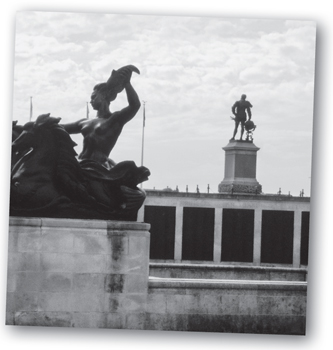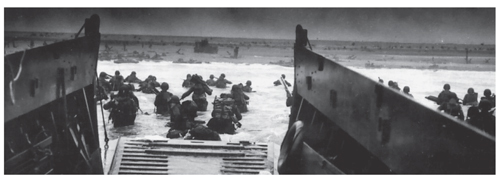Plymouth (22 page)
Authors: Laura Quigley

Sergeants J.S. Holmes and W.J. Bateman from the 111th carefully recorded their names on the wall at Crownhill Fort. They would be in Plymouth for a year, training hard in preparation for their role as artillery cover for the 116th regiment, the ‘Stonewall Brigade’, also from Virginia. The 116th would be in the first waves of soldiers to land at ‘Omaha Beach’.
Suddenly, one morning, Plymothians awoke to find the city eerily deserted. All the ships, all the men and their machines were gone. It was 6 June 1944. D-Day.
Holmes and Bateman were at last making their journey to Normandy as part of the vast Allied forces, but the carnage they faced on their arrival is difficult to imagine. Instead of the infantry advancing up the heavily-fortified beaches, the 111th were presented with mayhem and a coastline awash with the dead.

The entrance to Crownhill Fort.
The 116th regiment, for whom they were to provide cover, had been hit the hardest. Over one third – 1,000 men – of the 116th were already dead or wounded in the first wave. The first ten minutes were a disaster. Several companies no longer existed at all, obliterated by the unexpected fire-power of the German forces entrenched in the ridge forts above the beach. Even the Germans were astonished and dismayed by the slaughter they witnessed. The German commander of Widerstandsnest 76, overlooking the beach, made the following report to his headquarters:
At the water’s edge at low tide near St Laurent and Vierville, the enemy is in search of cover behind the coastal obstacles. A great many vehicles – among these 10 tanks – stand burning at the beach. The obstacles demolition squads have given up their activity. Debarkation from the landing boats has ceased, the boats keep farther seawards. The fire of our strong points and artillery was well placed and has inflicted considerable casualties among the enemy. A great many wounded and dead lie on the beach.
There were so many dead that there was no room on the beaches for the next waves of infantry to land. In the chaos, the 111th found themselves on the beach and under fire with no artillery. Their amphibious trucks (DUKWs), transporting their brand new 105mm howitzers to the shore, had either been hit by German forces or swamped, sinking in the English Channel. Senior officers of the military forces had been warned that the amphibious transports could not survive the combined weight of artillery and men under those conditions, but the warning had gone unheeded – and suddenly the 111th were effectively useless.
![]()
Not to forget the Pacific Theatre – placed in front of St Andrew’s church on 11 November 2011 was a memorial to one Plymouth man who died as a prisoner of war in arguably the worst of all war-time atrocities, the
Maros Maru
.
In 1944, to escape the approaching allies, the Japanese prepared to retreat, determined to take all their POWs with them. A small ship, the
Maros Maru,
set out for the coast of Java with 500 POWs and their Japanese guards aboard, with a further 150 POWs, most suffering from diarrhoea and beri beri, collected en route. The POWs were crammed into every available space, with wounded propped up in stairwells and dying men laid out on the deck in the blistering sun. Storms brought high seas and waves washed over the crowded deck. Suddenly the ship’s engines failed and they had to call in for repairs at Macassar. The ship remained in dock for forty days, the heat, beri beri and lack of food killing 150 men; the dying, screaming in agony, were refused all relief. The dead were thrown overboard with sand-bags tied to their feet. Only 325 reached Java, emaciated wrecks of men, many driven insane by the horrific conditions.
![]()
Liaison could have warned the transports to delay heading for the beach while they were still under fire, but the radios had been damaged by seawater. One of Battery B’s DUKWs was struck by a wave and sank while being launched, well before it made it to the beach – Sergeants Holmes and Bateman were in Battery B. Another six DUKWs sank while circling for six hours, waiting for an opportunity to land.
The survivors of the 111th gathered on the shore, under fire and aware that all their training had come to nothing. Suddenly their commander, Lieutenant Colonel Thomas Mullins, announced to his disheartened terrified men: ‘To hell with our artillery mission. We’ve got to be infantrymen now!’ He moved along the seawall, urging his soldiers to return fire, only to be fatally wounded by a sniper’s bullet – he was dead within hours. Thomas Mullin’s image is on the website at
www.marylandmilitaryhistory.org
in memory of his brave efforts to save his men and continue their mission.

A statue of Sir Francis Drake guards the War Memorial on Plymouth Hoe. The photograph below shows soldiers storming the beaches during D-Day. (NARA, 23-0455M)
The surviving members of the Virginia National Guard fought their way in small teams up the beach – all plans tossed aside – braving minefields and the German fortifications, their sheer force of will eventually taking Omaha Beach by nightfall. Landings were finally resumed, with another 20,000 reinforcements landing on 7 June. ‘D-Day’ resulted in nearly 10,000 Allied casualties – actually less than expected. Thirty-nine men of the 111th Field Artillery Battalion who had trained in Plymouth were amongst the dead.
The two men who had written their names so proudly on the walls of Crownhill Fort, Sergeants J.S. Holmes and W.J. Bateman, are not among the list of casualties. I like to think they made it home in one piece, to families and friends in Virginia.

1625-1645
UNDER SIEGE
![]()
R
ELATIONS BETWEEN ENGLAND
and Spain broke down once again as King Charles I came to the throne. Failed plans for his marriage to a Spanish princess brought only humiliation and Charles subsequently declared war on Spain. His father King James I had left the country in a financial mess, and now was Charles’ chance to recapture some of that wealth, but the wars brought only death, disease and deprivation to his naval port of Plymouth.
In 1625, ninety ships and 10,000 soldiers mustered in Plymouth Sound, inadequately equipped and ill-fed. The monies raised to support the troops had been embezzled away by the naval administrator, Sir James Bagge, who lived at Saltram House. To make matters worse, plague raised its ugly head again, and Plymouth could not afford the cost of boarding all these men. Many of the soldiers were left starving and without lodgings, stealing just to stay alive.
King Charles inspected his troops on Roborough Down in a carnival atmosphere, plumes waving over his beaver cap. However, he failed to notice just how ragged and rebellious his army was. Under the leadership of Charles’ court favourite, the Duke of Buckingham, the fleet sailed from the Sound. It sailed back, in terrible disarray, the moment the King departed, actually colliding with each other in the Cattewater. The fleet finally managed to get itself in order and sail, but it was not prepared for the mission ahead: it was hugely deficient in both ammunition and stores. Moreover, the Spaniards had been secretly forewarned of the attack.

King Charles I. (With the kind permission of the Thomas Fisher Rare Book Library, University of Toronto)
![]()
The crew of the
Amersfoot
, a Dutch vessel moored in Plymouth Sound, were charged with barbarous cruelty. They watched and followed a group of English shipwrights leaving work at the Cattewater dock and then attacked them with swords. The fighting swelled as Dutch sailors and English dockmen joined the riot, with pistols and cutlasses. One onlooker was knifed to death. When challenged by the mayor, the Dutch cried that their attack was in response to the failure of King Charles I to keep his word with Holland. The King’s foreign policies were tearing Plymouth apart.
![]()
